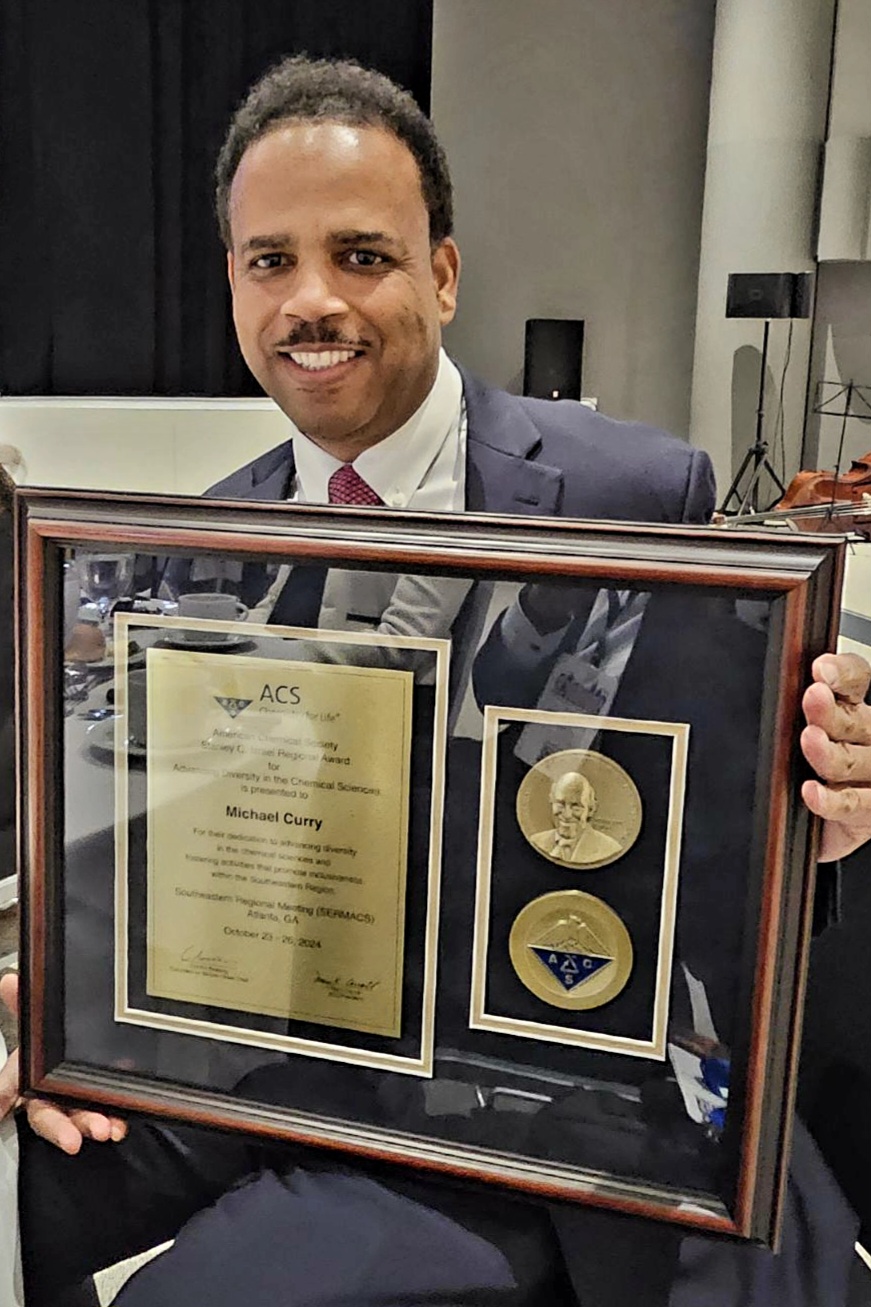
Chancellor Martin ‘Side by Side’ Episode Debuts on PBS
02/10/2026
By Jamie Crockett / 11/08/2024 Research, Joint School of Nanoscience and Nanoengineering
EAST GREENSBORO, N.C. (Nov. 8, 2024) — The Southeastern Meeting of the American Chemical Society has honored Michael Curry, Ph.D., with the Stanley C. Israel Regional Award. The award is meant to “recognize individuals and/or institutions who have advanced diversity in the chemical sciences and significantly stimulated or fostered activities that promote inclusiveness within the region.”
Curry, a professor of nanoengineering at the Joint School of Nanoscience and Nanoengineering, has advocated for historically Black colleges and universities (HBCUs) and unrepresentative minorities throughout his academic career spanning two decades.
“I have been an ACS member for more than 10 years and have served as an advisor for student chapters at various universities, reviewed student chapter reports, organizing and chairing scientific and diversity-related symposia regarding engaging HBCUs,” he said. “I’ve also been a guest editor of one of ACS’ most prestigious impact journals, ‘Accounts of Chemical Research,’ where the special issue was focused on the amazing research that is taking place at our nation’s HBCUs.”
Curry led a special issue in 2023, and from that special issue, approximately 30 HBCUs were invited to discuss their published research, collaborations with predominantly white institutions (PWIs), successful results and what they wish they had in their laboratories that would have made the projects more beneficial to their institutions and students.
“It was an honor to be nominated and even selected for the Stanley C. Israel Award. There are so many people out there doing so many wonderful things,” he said. “To know that the work that I’m doing, have done and will continue to do now at N.C. A&T is something that is being recognized, the award gives me a platform to do even more.”
Given Curry’s formal education training in PWI systems, he realized his career as an HBCU faculty member would be more than just focused on research. He understood that his colleagues at PWIs didn’t fully understand the culture of STEM at his institution.
“When I started my career as an HBCU faculty and researcher, I felt a sense of connection to my career goals and training that I didn’t feel previously,” Curry said. “This motivated me to build research connections with the non-HBCU chemical community that incorporated the awareness and best practices for elevating the voices of HBCU faculty and students within the partnerships.
“Imagine if HBCUs were given the resources that we’re due and what the faculty and students can continue to accomplish and contribute to our nation’s competitiveness in science and technology. We have to start educating our non-HBCU colleagues on how to engage us.”
Curry incorporates opportunities for his colleagues and potential collaborators to visit JSNN before entering into research projects.
“My advocacy for HBCUs is for awareness and meaningful engagement,” he said. “HBCUs are not a monolith. There are well-resourced HBCUs and some that are not, there are some that are highly focused on research and others that are focused on the educational aspect of academia.
“It helps researchers at a PWI to think about collaboration with HBCUs before putting the metrics in place to determine success not just for their institution, but something that is mutually beneficial for the HBCU as well.”
 Israel Award nominees must have “created and fostered ongoing programs or activities that result in increased numbers of persons from diverse and underrepresented minority groups, persons with disabilities, or women who participate in the chemical enterprise.”
Israel Award nominees must have “created and fostered ongoing programs or activities that result in increased numbers of persons from diverse and underrepresented minority groups, persons with disabilities, or women who participate in the chemical enterprise.”
“Part of ACS’ commitment is to cultivate a diverse, equitable, inclusive and respectful community of chemistry professionals. Those are our organization’s core values,” said Curry.
Curry is also a part of the ACS Cellulose Division, and the Diversity, Equity, Inclusion, Respect and Belonging committee within that division, which was formed to engage members with activities related to those principles. Lucian Lucia, Ph.D., leader of the committee, nominated Curry for the Israel award.
“Dr. Michael Curry exemplifies the necessary passion and dedication in serving the research and teaching needs at HBCUs to energize and empower them to attract the best and brightest talents. His unwavering, ethical, and singular commitment is a testament to his character which inspires all of us in the scholarly community to wholeheartedly support his initiatives,” said Lucia, a professor in North Carolina State University’s Departments of Forest Biomaterials and Chemistry.
“Dr. Curry is a natural leader who has made an impact on the scientific community that extends well beyond the lab and a gifted mentor who makes a real difference in the lives of his students,” said Mike Schwartz, Ph.D., managing director for the National Science Foundation Center for Sustainable Nanotechnology. “His visionary approach to STEM education and inspirational leadership are providing a potentially transformative path towards preparing students from historically marginalized and minoritized communities to become the next generation of STEM leaders,”
Curry joins the ranks of more than 50 individuals and institutions to receive the regional award since 2005. Daniel Rabinovich, Ph.D., JSNN’s associate dean, received the award in 2013.
Media Contact Information: jicrockett@ncat.edu